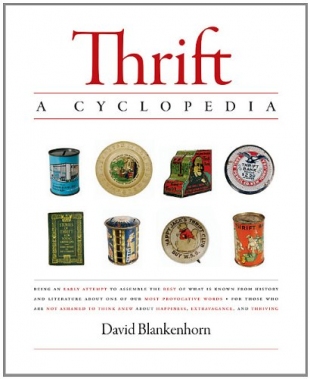David Blankenhorn is founder and president of the Institute for American Values, a nonpartisan organization dedicated to strengthening families and civil society in the United States and the world. For the last three years, he has led an initiative at the Institute to study thrift. The result of his efforts is a timely overview of this virtue which encompasses the ideals of hard work, financial prudence, and generosity. Blankenhorn has gathered hundreds of quotations, sayings, proverbs, and photographs from the past when thrift was regarded as a highly esteemed cultural value.
We are now seeing the disastrous consequences of an era of easy credit, indebtedness, instant gratification, and living beyond our means. The worldwide financial crisis will be with us for quite a while, and so this is a perfect time to reconsider other approaches to handling money and possessions.
In 1926, Richardson Campbell wrote: "There are few words in the English language that have a more interesting history, or convey a deeper moral than the word 'Thrift.' " Blankenhorn agrees. He sees the term as "a multifaceted philosophical concept for which there is no single precise synonym in the English language." He tackles this complex subject by considering five distinct ways of understanding what thrift is: as growing, as good fortune, as prospering, as saving, and as hoarding. Today if you asked most academics what the term means, they would respond, "Being cheap and stingy."
Blankenhorn sees thrift as a set of principles and ethical guidelines that lead us to use all we have in the wisest way to promote thriving. It is made up of three traits:
"Industry: hard work; the great value and necessity of persistent, diligent, careful, productive labor. (A thrift maxim: the reward for good work is more work.)
Frugality: being sparing, as regards using or spending for myself; the worth of conserving and reusing; and the importance of eliminating waste and avoiding extravagance.
Trusteeship: what is mine, I hold in trust; my wealth (my thrift) is ultimately for the purpose of helping others and contributing to the common good."
Being thrifty is worked out in the domains of individual and household, commercial, and public; it is based on three assumptions about human nature:
1. Productive work is good
2. What we have is not ours.
3. Giving people things is not as good as helping them to help themselves.
In Moral Education in School and Home, J. O. Engleman stated in 1918: "To earn what you can; spend what you must; give what you should, and save the rest — this is thrift."
After discussing the cases against thrift made through the years, Blankenhorn introduces a large and impressive group of thrift visionaries who have shed light on the subject, including Daniel Defoe, John Wesley, Benjamin Franklin, Clara Barton, John Wanamaker, Elbert Hubbard, Booker T. Washington, and Frank Capra. In his examination of institutions that have advanced the cause of thrift, the author looks at friendly and fraternal societies, mutual savings banks, producer and consumer cooperatives, building and loan associations, and credit unions. Also under this umbrella, Blankenhorn talks about four things which could come to the fore during our present-day financial crisis: thrift boxes, gardens, public libraries, and thrift shops. He ends this section with social movements which have been generated to advocate and promote pro-thrift social changes by building international solidarity, bringing people together, organizing sacrifice, and training children.
In an address in 1867, Horace Greeley said:
"One point wherein the American people are exceedingly deficient is that of method. We are energetic; we are audacious; we are confident in our own capacities and in our national destiny; but we are not a systematic, a frugal, economical people . . . the differences between our people and the Europeans are immense."
The truth of this observation is born out by statistics quoted in the book: In 2005 and 2006, for the first time since the Great Depression, and in the context of historically low unemployment, Americans overall spent more than they earned, meaning that the national savings rate has dropped to below zero. Nearly half of all credit card holders have missed payments in the past year, and an estimated one in seven U.S. families is dealing with a debt collector. It's no wonder that in a pro-debt atmosphere, Donald Trump rather than Warren Buffet is a cultural icon. Blankenhorn predicts a new thrift movement in America and this bellwether volume gives us many reasons why this is a morally good thing for citizens to practice.
